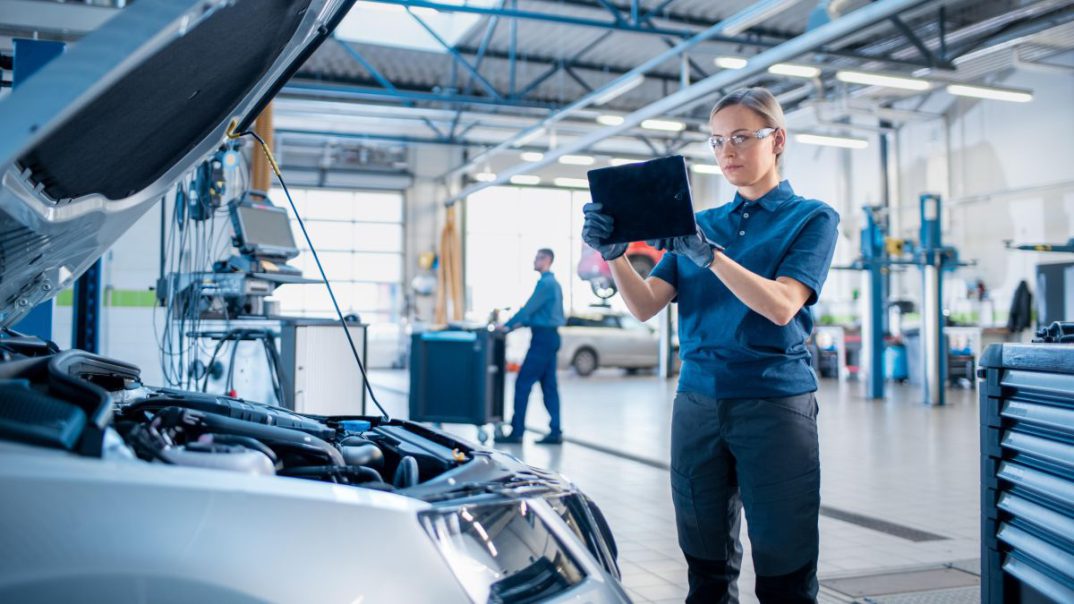Aaron Flett, owner of Kent Collision in Washington state, said when he opened his shop 10 years ago and considered what he needed to do to attract and retain employees, he thought about the differences he’d seen and heard about Walmart’s Sam’s Club versus Costco, which is headquartered about an hour from his shop.
“Sam’s Club, at least up here, failed, and they’re all gone [from the Pacific Northwest],” Flett said, during a Talent Pool and Education Committee panel discussion at the Collision Industry Conference (CIC) this spring. “Costco is thriving across the country.
Aaron Flett.
“One of the big things that we learned about the difference is just a work-life balance [for employees],” Flett said. “We’ve all had techs who want to work 10- or 12-hour days. We don’t really allow that. We want to make sure they get their eight hours in and go home, to enjoy their family, be healthy, have longevity in life and longevity in the industry. We want fair compensation plans that make them want to not have to work 12-hour days.”
Another Washington state shop owner on the panel, Micah Strom of Modern Collision Rebuild and Service, said his company took a different approach to providing that work-life balance. “We switched to four 10s, which is a little unusual in our industry, but has been very well accepted by our team,” Strom said.
“It’s a great attraction for new talent coming in. We get three days a week to spend with our family at home. Some of them do have things going like daycare or getting kids off to school, so we have flexible hours. I think it’s important to accommodate because everybody has different things going on in life.”
Building an Inviting Work Culture
Another panelist, Kevin House of Center Collision in Tacoma, WA, said he’s placed an emphasis on employee retention by focusing on building camaraderie and culture within his 30-year-old business.
 Micah Strom.
Micah Strom.
“We look for opportunities for our employees to interact not just at work, but outside of work,” House said, pointing to recent paintball contest his employees had against employees of a nearby tire shop. “My employees just had a great time. That’s part of our culture, making it not just about work, but about a little bit of a life experience.
“Does anybody know what national holiday was last Friday? You guys all missed the boat: It was National Grilled Cheese Day,” House continued. “There’s a holiday for every day of the year. You can Google it to create opportunities. We grilled cheese sandwiches for a whole staff. Everybody had a great time. We shut down for an hour and all have lunch together every Friday. We take the whole crew out boating every year. We just look for opportunities to build a team, to create that culture and make it more than just going to a job.”
The panel agreed that improved benefits have become as important as wages in terms of attracting and retaining employees.
Young Collision Techs Look for Health Care, PTO
“One thing that I’ve found surprising, that’s changed since I was a tech in the industry, is that it seems like people coming in want a better benefits package,” Flett said. “When I was in my 20s as a prepper or a painter, I just wanted a paycheck. Give me more money, fewer benefits. But now they definitely know the importance of having good benefits. We’ve recently added a 401(k) package. We pay for everybody’s vision and dental 100%, and we’ve increased our contribution to the actual medical portion of the health insurance as well. That helps us compete with the MSOs that also have a pretty good benefit package based on their size. So it’s an investment on our part, but it’s worked out pretty well for us.”
Strom agreed.
“We have the dental, vision and life insurance,” he said. “We’ve had a really good health care plan, and a 401(k). We also just started [giving new hires] one week’s vacation after six months. So they’re not working a whole year without having any paid time off. Times have changed. This younger generation needs something different. It’s about adapting and working with it, not against it. If you want to sit there and stay the same, you’re going to end up being behind.”
Strom also said it’s important for the industry to be involved in their local schools, saying his shop tries at least once a year to bring an intern in for job shadowing.
“I’d have to say probably at least six of them we actually hired on afterwards,” he said. “If we aren’t involved with the schools, there’s so many other trades out there that are. In Kitsap County, they have a ‘Try-a-Trade’ event. This last year, they bused in 650 students from all around the Puget Sound. We had a booth there, to talk to them about the collision industry and the automotive industry, in general. Probably a lot of us growing up, your dad worked on cars, or your uncle or your grandpa. Nowadays, the kids don’t have that opportunity. The parents take their car to a shop. That’s all they know. So it’s our job to get out there, to talk to the kids, to get involved in the schools, and show them this a rewarding career and it’s a lot of fun.”





